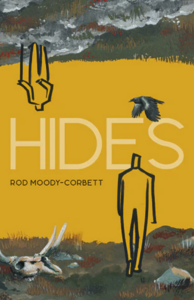By Vivian Hansen
Hides
by Rod Moody-Corbett
Breakwater Books (2024)
He is unnamed. But he is well known to us. We have sat in his classroom, shared his bench at lunch hour, lived in an apartment similar to his, and occupied a seat beside him on the C-train. We might call him Hero. And yet, it would be a mistake to define him as unique. We do not recognize him as especially rare. He reflects all of us, especially the male gender.
In his debut novel, Moody-Corbett has set out the trajectory of men; of success and shattering failures: the PhD acquired so that one can finally begin again at the bottom of the Sessional Instructor rung. The first person point of view reveals our Hero as an endearing and hard-working bumbler with a gift for high diction. He suffers from the grasping claw of addiction to drugs, which is only a symbolic hell to the one he wishes to escape.
His close friend Travis has been murdered on the C-train after stepping in to ‘take a bullet’ for others. After this tragedy, the men gather. Travis’ father Willis, Baker, and Travis’ younger brother Isaac organize a hunting trip to a place called “The Castle” in Newfoundland, to hunt moose. They invite our Hero and they pay his way. This will be a bonding experience, following the mythology of men as hunters. And yet, each of these men pivot their life vision around the wisdom of some extraordinary women. From Caitlin, Travis’ mother, who reveals the near collapse of her marriage:
… the moment we knew about Travis, … everything that was wrong, just sort of dissolved. It was almost like… through him, he gave us a second chance. (85)
And Judith, their hunt leader and owner of the lodge: “I really hate men, all men, all the men, present company included.” (163) What is man-made is toxic: “The spill was man-made, was male. All spills, all wars, are.” (164). She theorizes: “ … in a world made of ambience, … we harness the male ego, its deepest wills, its desire to conquer, kill, quest, and juxtapose these wills against nature (168). The women exhibit an uncanny ability to excise the hunt; to see it for what it is and garner no particular threat from it.
Moody-Corbett’s ability with simile reveals how the practice of poetics is often underrated in prose. Our Hero observes: “… slabs of ice shifting in the sluggish current like comet shards, like fallen omelets of moon.” (217) I marvelled at the discovery of a kenning: “There followed a disturbing crunch as the head broke clear of the throat and Isaac steered the gristly brain helmet away…” (189).
Moody-Corbett has succeeded in defining a new genre: how men come of age and flee patriarchy. Perhaps it is perceived as through a glass darkly, but this novel offers a fictionalized and layered prescription for the mental health of contemporary men. I look forward to his next novel.
Vivian Hansen’s publications include three full-length books of poetry and several chapbooks. She has published essays in Coming Here, Being Here, and in Waiting. She also has a short piece in the Calgary Public Library Dispenser Series (2019) “Where We Surfaced.”

